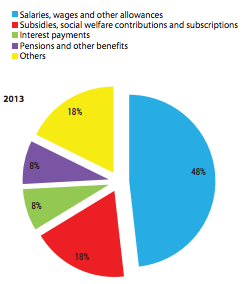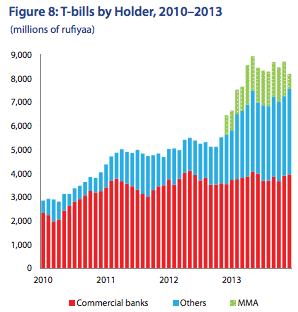Shortfalls in revenue or overruns in expenditure in 2014 “will undermine medium-term debt sustainability” and adversely affect the exchange rate and prices, the Maldives Monetary Authority (MMA) has cautioned in a report on macroeconomic developments in 2013.
On the outlook for the economy in 2014, the report released this week noted that the fiscal deficit was projected to decline to 3.2 percent this year from 4.7 percent in 2013 on the back of higher revenue from tourism-related taxes and payments for resort lease extensions as well as rationalisation of subsidies.
“Despite this positive outlook, there is a considerable amount of uncertainty surrounding the 2014 budget. Overruns in current expenditure will most likely lead to financing difficulties for the government or further crowding out of the private sector,” the central bank warned.
“Any setback to fiscal consolidation either due to slippages in revenue or current expenditure will undermine medium-term debt sustainability and will have adverse implications for exchange rate and prices.”
Outlook for 2014
Economic growth in 2014 is projected at 4.5 percent, an increase of 0.8 percent from the previous year.
“Growth will be driven by the continued expansion of tourism activity which is to be mainly supported by the robust growth of Chinese tourists,” the report explained.
“In 2014, growth is also expected to benefit from the recovery of construction sector which registered declines in the past two years. Activity in the construction sector is expected to recover due to the easing of material shortages and the continued expansion of residential construction projects amid improved bank credit to the sector.”
While the transport and communication sectors are expected to grow “in tandem with better prospects for the tourism industry,” the report noted that primary fishing activity is projected to decline slightly.
Inflation is expected to “remain moderate” in 2014, which “largely reflects the weaker outlook for global commodity prices”.
However, lower commodity prices were expected to “offset the upward impact of one-off factors such as the introduction of GST on communication services and reversal of import duty for certain goods during the year.”
The current account deficit is expected to widen by 16 percent to US$269.9 million this year as “improved receipts from tourism is insufficient to off set the increase in imports, interest payments and remittance outflows.”
While imports are expected to grow “in line with the projected increase in economic activity from tourism, construction and government sectors,” exports are expected to decline on account of a projected decrease in fish catch and global tuna prices.
“Meanwhile, gross international reserves are projected to improve in 2014 mainly due to inflows from the planned new revenue measures stemming from the tourism sector. In line with this improvement, reserves in terms of months of imports, are also projected to increase slightly,” the report stated.
Revenue and expenditure
While total revenue excluding grants reached MVR11.5 billion (US$745 million) last year – an increase of 18 percent from the previous year – revenue collection was lower than anticipated “owing to delays in the implementation of the planned new revenue raising measures as envisaged under the budget.”
Tax revenue accounted for 75 percent of total revenue in 2013 while non-tax revenue “declined marginally” to MVR2.8 billion (US$181 million).
Total government expenditure in 2013 was MVR13.5 billion (US$875 million), which was four percent below the target.
The report explained that capital expenditure was significantly lower than expect, “which offset sizeable overruns in current expenditure.”
“Meanwhile, although the government repaid some of the unpaid bills from previous years, a further build-up of arrears took place in 2013 as well and if these are considered total expenditure for 2013 will be much higher than estimated,” the report stated.
 Current expenditure accounted for 84 percent of total government spending in 2013, reaching MVR11.4 billion (US$739 million), which was 11 percent in excess of the budgeted amount.
Current expenditure accounted for 84 percent of total government spending in 2013, reaching MVR11.4 billion (US$739 million), which was 11 percent in excess of the budgeted amount.
Salaries and allowances contributed the largest share at 48 percent of current expenditure, “reflecting the bulky public sector,” followed by subsidies and social welfare contributions at 18 percent, administrative costs at 13 percent, and interest payments at eight percent.
As large debt repayments were made between December 2012 and February 2013, interest payments in 2013 declined by 19 percent compared to the previous year and stood at MVR893.6 million (US$57.9 million).
Debt and deficit
As a result of “slippages in both revenue and expenditure” in 2013, the fiscal deficit is currently estimated at 4.7 percent of GDP, down from 9.2 percent in 2012.
The budgeted target for 2013 was however 3.6 percent.
The report noted that total debt of the government reached 78 percent of GDP at the end of 2013 as a consequence of “the sustained high budget deficit” over the past years.
Domestic debt accounted for 58 percent of total public and publicly-guaranteed debt.
 “In 2013, the financing requirement of the government was met almost entirely through domestic sources: mainly through the issuance of Treasury bills (T-bills) to the domestic market and monetisation,” the report explained.
“In 2013, the financing requirement of the government was met almost entirely through domestic sources: mainly through the issuance of Treasury bills (T-bills) to the domestic market and monetisation,” the report explained.
Net credit to the government by the MMA “increased from MVR4.7 billion at the end of 2012 to MVR6.0 billion at the end of 2013,” the report revealed.
The total outstanding stock of T-bills meanwhile reached MVR8.2 billion by the end of 2013.
“A large part of this increase was attributable to the increase in investments by other financial corporations and public non-financial corporations, which can be seen from the increase in their share of holdings (as a percent of total outstanding T-bills) from 28% at the end of 2012 to 44% at the end of 2013,” the report stated.